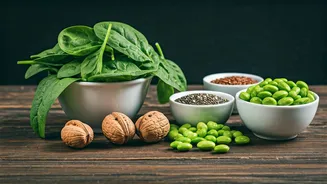Introduction: Omega-3 Power
Omega-3 fatty acids are essential nutrients crucial for maintaining optimal health. They play a vital role in reducing the risk of heart disease, lowering
blood pressure, and reducing inflammation. While often associated with fish, Omega-3s are also abundant in various vegetarian sources. This article spotlights 10 easily accessible vegetarian foods, ensuring everyone can benefit from these essential nutrients for a healthier heart. Including these foods in your regular diet can significantly improve your cardiovascular health and overall well-being. This guide makes incorporating these beneficial nutrients into your lifestyle simple and enjoyable.
Flax Seeds: Tiny Giants
Flax seeds are a nutritional powerhouse, widely recognized as one of the best vegetarian sources of Omega-3 fatty acids. These tiny seeds are incredibly versatile and can be added to various meals. One tablespoon of flax seeds provides a substantial dose of Omega-3s, alongside fiber and other beneficial nutrients. Add them to smoothies, sprinkle them on yogurt, or incorporate them into baked goods for an easy boost of heart-healthy benefits. Regular consumption of flax seeds contributes significantly to improving heart health by reducing inflammation and improving cholesterol levels.
Chia Seeds: Superfood Status
Similar to flax seeds, chia seeds are another excellent source of Omega-3s, gaining popularity due to their high nutritional value and versatility. These seeds can absorb a large amount of water, forming a gel-like consistency that makes them ideal for thickening smoothies or puddings. Just a small serving of chia seeds delivers a potent dose of Omega-3 fatty acids, along with fiber, protein, and antioxidants. Incorporate them into your diet by sprinkling them on salads, adding them to oatmeal, or using them to create chia seed pudding. Their regular consumption supports heart health and provides additional health benefits.
Walnuts: Nutty Goodness
Walnuts are a delicious and convenient way to include Omega-3s in your diet. These nuts are a rich source of alpha-linolenic acid (ALA), a type of Omega-3 fatty acid. A handful of walnuts provides a significant amount of this essential nutrient, making them a great snack for heart health. Walnuts are also packed with antioxidants and healthy fats, contributing to overall well-being. Enjoy walnuts as a snack, add them to salads, or incorporate them into your meals. Their consumption promotes cardiovascular health and enhances cognitive function.
Hemp Seeds: Versatile Choice
Hemp seeds offer a complete protein profile and are an excellent source of Omega-3 fatty acids. These seeds have a mild, nutty flavor, making them easy to incorporate into various dishes. They can be added to smoothies, sprinkled on salads, or used as a topping for yogurt and oatmeal. Regular consumption of hemp seeds can contribute to improved heart health, thanks to their Omega-3 content and other essential nutrients. Their versatility and nutritional benefits make them a valuable addition to any diet.
Edamame: Soy Delight
Edamame, or young soybeans, is a popular snack and a nutritious source of Omega-3 fatty acids. These beans are high in protein, fiber, and various vitamins and minerals, promoting overall health. Edamame can be enjoyed steamed, boiled, or roasted, making them a versatile addition to meals or a healthy snack. Including edamame in your diet can support heart health and provide a good source of plant-based protein, making it an excellent choice for vegetarians and anyone seeking a nutritious snack.
Brussels Sprouts: Green Power
Brussels sprouts, often overlooked, are a great source of Omega-3 fatty acids and other essential nutrients. These cruciferous vegetables are packed with vitamins, minerals, and antioxidants, contributing to overall well-being. Brussels sprouts can be roasted, steamed, or sautéed, offering various ways to incorporate them into your diet. Regular consumption of Brussels sprouts supports heart health by helping reduce inflammation and providing essential nutrients. Their nutritional profile makes them a valuable addition to a balanced diet.
Seaweed: Ocean's Gift
Seaweed, such as nori and kelp, is a natural source of Omega-3 fatty acids. This nutrient-rich food also contains iodine and other beneficial minerals, providing a unique dietary addition. Seaweed can be enjoyed in various ways, like in sushi rolls, salads, or as a snack. Adding seaweed to your diet can benefit heart health and provide essential minerals that support overall health. Its unique nutritional profile makes it an interesting and healthy food to consider.
Spinach: Leafy Goodness
Spinach, a leafy green vegetable, contains Omega-3 fatty acids and is rich in vitamins, minerals, and antioxidants. This versatile green can be added to salads, smoothies, or cooked dishes. Spinach’s nutrient-rich profile makes it a valuable food for promoting overall health, including heart health. Its ability to reduce inflammation and provide essential nutrients makes it a staple in a balanced diet.
Tofu: Soy Staple
Tofu, a versatile soy-based product, offers a good source of Omega-3 fatty acids, making it a great option for vegetarians. Tofu can be used in numerous dishes, from stir-fries to soups and salads, offering a flexible addition to your diet. It also provides a great source of plant-based protein, adding to its nutritional benefits. Adding tofu to your diet can support heart health and offer several other health benefits. It's a versatile food that can be enjoyed in many different ways.
Conclusion: Embrace Omega-3s
Incorporating these 10 everyday vegetarian foods into your diet is a simple way to boost your intake of heart-healthy Omega-3 fatty acids. By regularly including these options, you can actively support your cardiovascular health and overall wellness. From flax seeds and chia seeds to walnuts and tofu, these foods offer delicious and accessible ways to harness the benefits of Omega-3s. Embrace these options to promote a healthier, happier you!




















